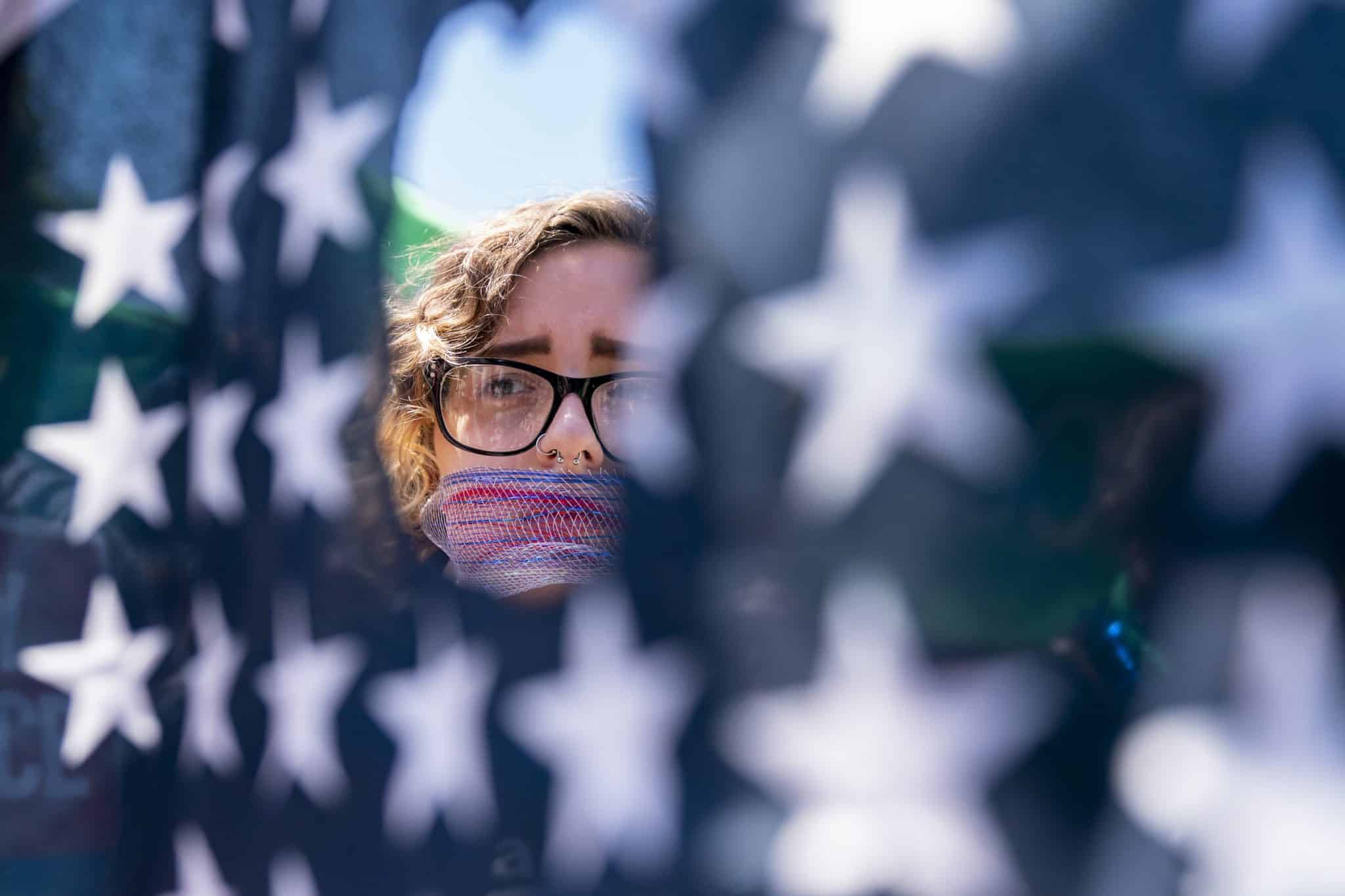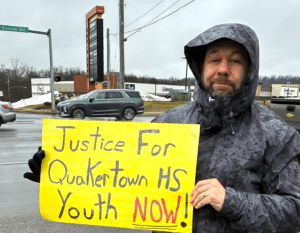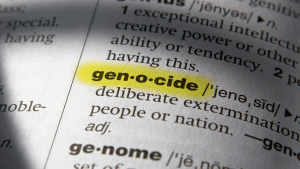Pennsylvania law protects abortion access for patients up to 24 weeks gestation, but a new proposed rule would limit that access for a group experts say is already systematically disenfranchised—women veterans.
The Trump administration on August 4 proposed a rule to reinstate “a full exclusion on abortions and abortion counseling” from the medical benefits provided by the Civilian Health and Medical Program of the Department of Veterans Affairs (CHAMPVA).
The rule states abortions may only be obtained through the VA “when the physician certifies that the life of the mother would be endangered if the fetus were carried to term.”
The narrow exception to save the life of the mother falls in line with abortion bans enacted by several states since the overturning of Roe v. Wade.
But a recent report from the Gender Equity Policy Institute found that “a mother’s risk of dying was nearly twice as high in [abortion] banned states,” according to the study, which compared outcomes for mothers during pregnancy, through childbirth, and soon after birth.
The proposed VA rule, which would impact the approximately 65,000 women veterans in Pennsylvania, does not provide for exceptions in cases of rape or incest, however; statistics show ”one in three women veterans report having experienced sexual trauma, including sexual assault, during their service,” according to the Center for Reproductive Rights.
Local vets weigh in
“As a combat veteran myself, this feels like an attack on women veterans,” said Ashley Ehasz of Bensalem.
Ehasz is a former congressional candidate (2022 and 2024). She served in the army for nine years and receives healthcare through the VA.
“It’s insulting that we ask these women to fight in our wars, then we turn around and take away health care,” she said. “That’s one of the rights that they fought to protect.”
Ehasz noted that circumstances unique to women veterans, including PTSD and combat related injuries, put them at increased risk for complications during pregnancy. If access to abortion care is removed, consequences could be life-threatening.
Paul Lang Jr. of Ivyland is an army veteran whose father was a Navy surgeon. He receives supplemental health care through the VA in addition to his primary physician.
“This whole thing is disgraceful,” Lang said in response to the proposed rule. “The VA should uphold a woman’s right to make her own decisions about her body.”
Lang visits the VA two times per year. He’s been a member for more than 50 years and has “never had a bad experience.”
“It’s insulting that we ask these women to fight in our wars, then we turn around and take away health care.” – Combat Veteran Ashley Ehasz, Bensalem
Over the past few years, Lang said he’s noticed a change in the political climate which he believes is now impacting the VA. He described the administration’s policies as “cruel” and “anti-woman.”
He referred to a slogan he used while he campaigned for Pennsylvania state representative in 2024:
“Keep your theology off her biology!”
Nicole David of Oakdale is an Air Force retiree who served in the military for 26 years. She is a 100% disabled veteran and receives health care solely through the VA.
She echoed the sentiments of Ehasz and Lang, calling the proposed rule a “slap in the face” to the veteran community.
David noted that military sexual trauma is a specific category of trauma that the VA is uniquely trained to support. With the proposed rule to ban abortion health care and abortion counseling, she said women veterans could be forced to enter the civilian healthcare system to address issues such as unwanted pregnancy.
“The military is a male-dominated place,” David said.
“It has its own culture. As veterans, we feel that the [VA] system is specifically designed to address our needs. Automatically, there’s a sense of relief, because they understand the uniqueness of our situation.”
“It’s nothing against civilian therapists,” she continued, “I just don’t think they are trained to think about care in that way. So, forcing a veteran to go into the civilian system … we could be forcing them to relive that trauma all over again.”
Abortion and the armed forces, pre- and post-Roe
Since the VA benefits program was first established in 1999, abortion and abortion counseling was excluded due to the Hyde Amendment, which prohibits abortion funding through taxpayer dollars.
After the Supreme Court overturned the ruling of Roe v. Wade and federal protection on abortions was dropped, the Biden administration enacted a rule to “remove the exclusions on abortion counseling and establish exceptions to the exclusions on abortions” for recipients of CHAMPVA.
With federal protection gone, the Biden rule, effective October 2022, allowed women to access abortion through the VA, even in states with partial or total bans.
More than 400,000 women veterans live in abortion ban states, according to the Center for Reproductive Rights.
The Trump administration’s proposed rule would reverse the Biden-era protections, making abortion inaccessible through the VA, even in states where it’s constitutionally guaranteed.
And while VA benefits have been subject to political back and forth, Ehasz noted that TRICARE, the medical benefits program for active-duty service members, has never provided access to abortions and abortion counseling, due to the restrictions of the Hyde Amendment.
“For women in uniform, it goes back to the question, are there even options?” Ehasz said. “Women in active duty do not get to choose which state they’re stationed in.”
READ: If Abortion Abolitionists Get Their Way, Women Who Get an Abortion Will Face Homicide Charges
Ehasz said she believes the issue of reproductive rights is becoming counter-productive to the military’s efforts to draw in members.
“When we look at recruitment for the military, we’re struggling,” she said.
“If we’re making the decision [to join the military] harder for women based on health care, then they might think twice.”
“From a national security standpoint,” she continued, “at the end of the day, [the proposed rule] is just a bad idea.”
David added she believes the intended ban represents the administration’s “gut reaction” to a politically charged issue.
“It’s easy to hide behind the pro life vs. pro choice debate,” she said. “But there’s so much more nuance than that. Especially with this group.”
“This issue is on the minds of every veteran,” she continued. “Whether you use that [reproductive healthcare] service or not, you know somebody who has.”
What’s next?
After a 30-day period of public feedback, 24,333 comments were received on the proposed rule, both in favor and against.
One comment in opposition to the ban came from the Women’s Law Project. In the comment, WLP Staff Attorney Tyler Gillett brought up gender equity.
“The proposed rule would exclude from coverage a vital medical service needed only by female veterans … denying them equity in their care, equity that they are entitled to through their service to this country,” Gillett states.
Opposing members of Congress also spoke out during the public comment period, including Democrat Representative Julia Brownley (CA-26), who introduced the Reproductive Freedom for Veterans Act in the House of Representatives in response.
“I’m still hoping the leaders of character in Congress can stop this before it takes place,” Ehasz said.
“Myself and many other women veterans…we don’t have the luxury of going elsewhere,” she added. “I believe in the VA; I’m going to stick with the VA and continue to use it.”
David also said she plans to stick with the VA for now, though she has started to research the cost of entering the civilian healthcare system in the future, should she need to.
She noted a recent string of policies which have negatively impacted the VA: layoffs, the stripping of union rights, and guidelines against DEI and LGBTQ inclusion which she believes “opens the door for potential discrimination.”
“I’m paying close attention,” she said. “Will there be a time in the future that I don’t feel safe going there, or I can’t get what I need? I don’t know.”
The rule is still being reviewed. So far, a timeline for next steps has not been indicated.
According to womenshealth.va.gov, anyone with questions or concerns about reproductive health matters related to the VA can reach out to the Women Veteran Call Center at 855-829-6636.






